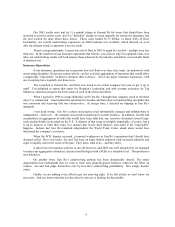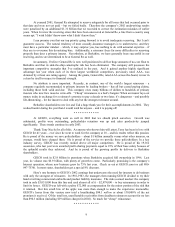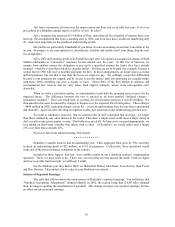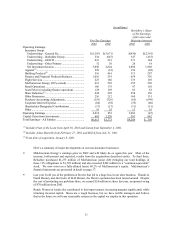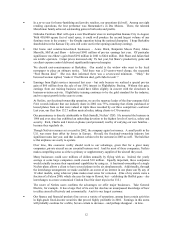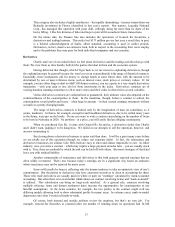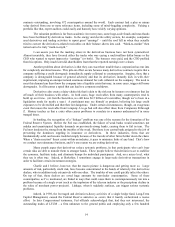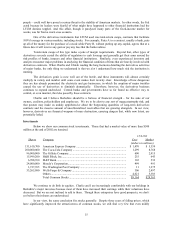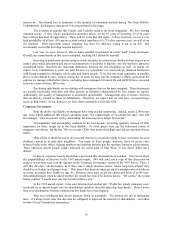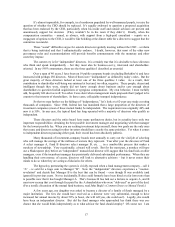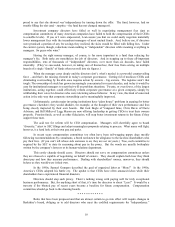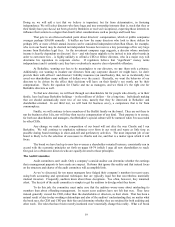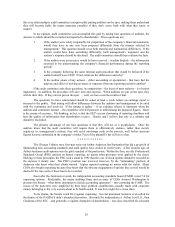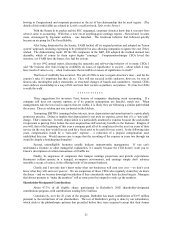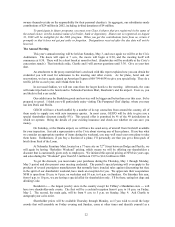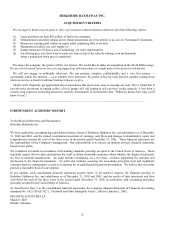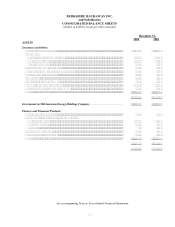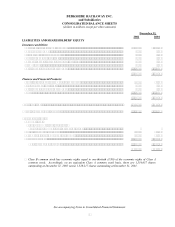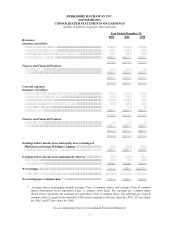Berkshire Hathaway 2002 Annual Report Download - page 19
Download and view the complete annual report
Please find page 19 of the 2002 Berkshire Hathaway annual report below. You can navigate through the pages in the report by either clicking on the pages listed below, or by using the keyword search tool below to find specific information within the annual report.18
proud to say that she showed real independence by turning down the offer. The fund, however, had no
trouble filling the slot (and – surprise – the fund has not changed managers).
Investment company directors have failed as well in negotiating management fees (just as
compensation committees of many American companies have failed to hold the compensation of their CEOs
to sensible levels). If you or I were empowered, I can assure you that we could easily negotiate materially
lower management fees with the incumbent managers of most mutual funds. And, believe me, if directors
were promised a portion of any fee savings they realized, the skies would be filled with falling fees. Under
the current system, though, reductions mean nothing to “independent” directors while meaning everything to
managers. So guess who wins?
Having the right money manager, of course, is far more important to a fund than reducing the
manager’ s fee. Both tasks are nonetheless the job of directors. And in stepping up to these all-important
responsibilities, tens of thousands of “independent” directors, over more than six decades, have failed
miserably. (They’ ve succeeded, however, in taking care of themselves; their fees from serving on multiple
boards of a single “family” of funds often run well into six figures.)
When the manager cares deeply and the directors don’ t, what’ s needed is a powerful countervailing
force – and that’ s the missing element in today’ s corporate governance. Getting rid of mediocre CEOs and
eliminating overreaching by the able ones requires action by owners – big owners. The logistics aren’ t that
tough: The ownership of stock has grown increasingly concentrated in recent decades, and today it would be
easy for institutional managers to exert their will on problem situations. Twenty, or even fewer, of the largest
institutions, acting together, could effectively reform corporate governance at a given company, simply by
withholding their votes for directors who were tolerating odious behavior. In my view, this kind of concerted
action is the only way that corporate stewardship can be meaningfully improved.
Unfortunately, certain major investing institutions have “glass house” problems in arguing for better
governance elsewhere; they would shudder, for example, at the thought of their own performance and fees
being closely inspected by their own boards. But Jack Bogle of Vanguard fame, Chris Davis of Davis
Advisors, and Bill Miller of Legg Mason are now offering leadership in getting CEOs to treat their owners
properly. Pension funds, as well as other fiduciaries, will reap better investment returns in the future if they
support these men.
The acid test for reform will be CEO compensation. Managers will cheerfully agree to board
“diversity,” attest to SEC filings and adopt meaningless proposals relating to process. What many will fight,
however, is a hard look at their own pay and perks.
In recent years compensation committees too often have been tail-wagging puppy dogs meekly
following recommendations by consultants, a breed not known for allegiance to the faceless shareholders who
pay their fees. (If you can’ t tell whose side someone is on, they are not on yours.) True, each committee is
required by the SEC to state its reasoning about pay in the proxy. But the words are usually boilerplate
written by the company’ s lawyers or its human-relations department.
This costly charade should cease. Directors should not serve on compensation committees unless
they are themselves capable of negotiating on behalf of owners. They should explain both how they think
about pay and how they measure performance. Dealing with shareholders’ money, moreover, they should
behave as they would were it their own.
In the 1890s, Samuel Gompers described the goal of organized labor as “More!” In the 1990s,
America’ s CEOs adopted his battle cry. The upshot is that CEOs have often amassed riches while their
shareholders have experienced financial disasters.
Directors should stop such piracy. There’ s nothing wrong with paying well for truly exceptional
business performance. But, for anything short of that, it’ s time for directors to shout “Less!” It would be a
travesty if the bloated pay of recent years became a baseline for future compensation. Compensation
committees should go back to the drawing boards.
* * * * * * * * * * * *
Rules that have been proposed and that are almost certain to go into effect will require changes in
Berkshire’ s board, obliging us to add directors who meet the codified requirements for “independence.”


